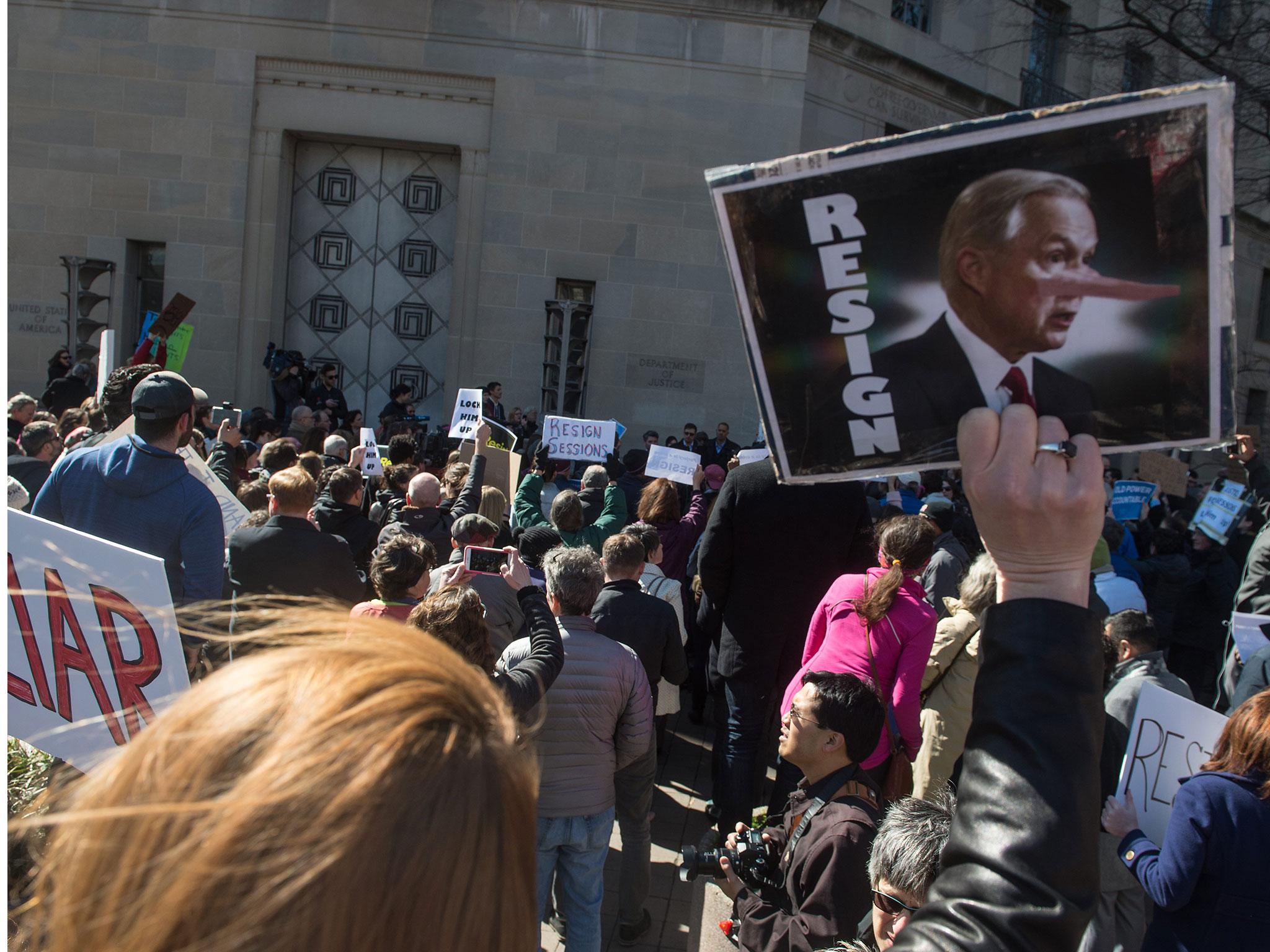Jeff Sessions 'used campaign funds' for trip to event where he met Russian ambassador
Attorney General pressured to remove himself from investigations into Russian interference in election

Jeff Sessions is accused of using political funds to travel to an event where he met Russia’s ambassador to the US, despite the White House’s claim he was acting solely in his role as a senator.
The Attorney General has removed himself from investigations into alleged Russian interference in the US election amid mounting pressure over two encounters with Sergey Kislyak.
One of them occurred at an event held by the Heritage Foundation on the sidelines of the Republican National Convention July.

Donald Trump’s administration admitted that Mr Sessions met the Russian ambassador but insisted any discussions were in his former role as a senator for Alabama.
But financial records uncovered by the Wall Street Journal and ABC News show he used political funds from his re-election account for the trip, while sources said he discussed Mr Trump’s campaign with Mr Kislyak.
“I never met with any Russian officials to discuss issues of the campaign,” he said in a statement on Wednesday night.
At that same event, the ambassador also spoke with Carter Page, who briefly advised Mr Trump's campaign on foreign policy, a source told the Associated Press.
Mr Sessions failed to disclose his conversations with the Russian ambassador during his confirmation hearing in Congress but rejected suggestions he attempted to mislead anyone.
But he did admit that he should have been more careful in his testimony, adding: "I should have slowed down and said, 'But I did meet one Russian official a couple of times.'"
When specifically asked whether there was evidence of anyone affiliated with Mr Trump’s campaign communicating with the Russian government, he had replied: “I'm not aware of any of those activities.

”I have been called a surrogate at a time or two in that campaign and I did not have communications with the Russians and I'm unable to comment on it.“
He also answered ”no“ in a written questionnaire when asked about contacts regarding the election.
Sarah Isgur Flores, a spokesperson for Mr Sessions, said there was “absolutely nothing misleading” about his answer.
She added that Mr Sessions had more than 25 conversations with foreign ambassadors as a senior member of the Armed Services Committee in 2016, continuing: “He was asked during the hearing about communications between Russia and the Trump campaign - not about meetings he took as a senator and a member of the committee.”
Some Democrats have called on Mr Sessions not only to recuse himself from the investigation but to resign, accusing him of “lying under oath”.
Dmitry Peskov, Mr Putin’s spokesman, said it was normal for Russian diplomats to meet with American politicians and a foreign ministry representative described the meetings as “everyday business”.
The President backed his Attorney General on Thursday night, calling him an “honest man” and claiming the scandal was a “witch hunt” mounted by Democrats.
“He did not say anything wrong,” Mr Trump wrote on Twitter. “He could have stated his response more accurately, but it was clearly not intentional.”
Conversations with Mr Kislyak were the cause of another blow to Mr Trump’s administration last month, when his national security adviser was forced to resign.
Michael Flynn admitted giving “incomplete information” to the Vice President over whether sanctions were discussed during phone calls in December.
A White House official said Mr Flynn met the Russian ambassador with Mr Trump's son-in-law, Jared Kushner, at Trump Tower in New York in December, describing the sit-down as a brief courtesy meeting.
Barack Obama’s administration had slapped successive rounds of penalties on the Russian government and selected individuals over the wars in Ukraine and Syria, which brought US-Russia relations down to the worst level since the Cold War.
Mr Trump has taken a markedly different approach to his predecessor, repeatedly praising Vladimir Putin during his election campaign and aiming to improve ties.
The President has dismissed a report by his own intelligence agencies after it found evidence of Kremlin involvement in cyber attacks that damaged Hillary Clinton’s campaign, and has claimed he has “no deals” or links in Russia.
But his continued refusal to disclose his tax returns, defying decades of precedent, has fuelled calls for the Senate Finance Committee to launch a formal review.
Democrats are also mounting a push for a wider investigation into alleged links between the Russian government and Mr Trump’s administration, transition and campaign teams.
Join our commenting forum
Join thought-provoking conversations, follow other Independent readers and see their replies
Comments
Bookmark popover
Removed from bookmarks